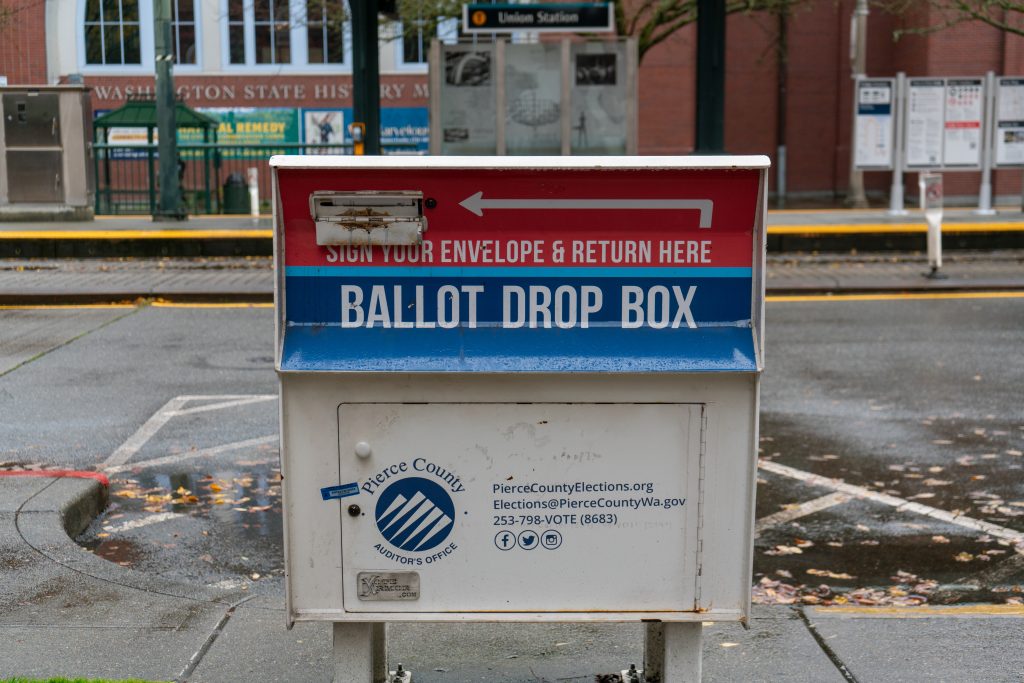One year away from the 2024 U.S. elections: Advice for new voters
As we get closer to a major election year, there is a lot to start considering when deciding to vote and who to vote for.
As the local elections of 2023 wrap up, America is setting its sights on the 2024 national races. For many, this is the first time that they will be able to vote, and it can be intimidating and confusing. I know that it was for me when I voted in the 2020 primary elections for the first time. With that, I thought I’d offer some advice and try to layout some of the key parts of election year. From the debates to the many levels of voting throughout the year, there is a lot to try to follow.
First, you have to make sure you are a registered voter. If you are not a registered voter, you won’t get a ballot to cast said votes. The UW Tacoma class registration process makes sure that each eligible student has registered to vote in Washington if they choose to. This is the first step in the voting process. It’s also important to remember to update your information, like your address or name, to be sure everything goes smoothly. Here is a link to check on all of that information: https://www.vote.org/
After you have registered to vote, you await your first chance to vote. You will be mailed a ballot when voting begins and can place it in any of the many ballot drop-off boxes around the Pierce and Kitsap County area. Two of the nearest ballot boxes to campus include the Tacoma Public Library and the UWT campus.

The decision is the most difficult part of this. It’s also the main reason that watching debates and having a rough understanding of the legal jargon and topic at hand are so vital. You are voting for the rights of you and those around you, the structure of our legal system, and the environment that you depend on. One great resource available to you is simply the internet. If you aren’t able to make it to debates, they are usually posted online within a matter of time. Another resource available to you is the Voter’s Guide, which is usually mailed alongside your ballot.
Now that you’ve registered, gotten a ballot, and gained a rough understanding of the matters you’re voting on, what’s next?
With most UW Tacoma students having their first chance to vote this next year, I went and asked some of the staff and older students what they have to say on the voting process and what they would have liked to know when they started to vote. I got a variety of answers.
One student wished they had known more about financial planning; this is something that needs to be considered when you vote as it impacts things like your taxes. The other two made a point about the corruption in politics and how that diminishes the value of politicians, saying “corporations are corrupt,” disparaging the power hunger that motivates the two parties.
Voting, while it has some issues structurally, is an important part of our lives and has great impacts on us, regardless of who it is directly aimed at. Gay rights, women’s rights, sovereignty of tribal nations, education, and protection of human rights are all matters which have been heavily discussed and debated in politics. They are incredibly impactful on many lives, even if voting might not seem like it has power in certain areas.
The overturning of Roe v. Wade is a prime example of this. Many who were for the overturn of Roe v. Wade whole-heartedly believed that this would only impact cases where they believe women were harming fetuses, which has been found to be untrue. With the overturn of this case in 2021, access to reproductive healthcare, like abortions and birth control, and bodily autonomy have been threatened for many.
An issue that has made its way into the forefront politics is the ongoing conflict in Palestine. This plays into voters’ decisions by bringing in morals; the beliefs of someone changes from person to person, and often the two parties support opposing sides, making people establish their values. Most of the U.S. government supports Israel in the conflict, while many voters support Palestine. This is playing a major factor in people’s decision on who to support in the 2024 election, some of whom are deciding not to vote at all.
Voting is something that can be a bit intimidating when you first start to go through the process, but it gets easier with experience. I hope that you have found some value in this article, and it sparked some interest in the upcoming election.



